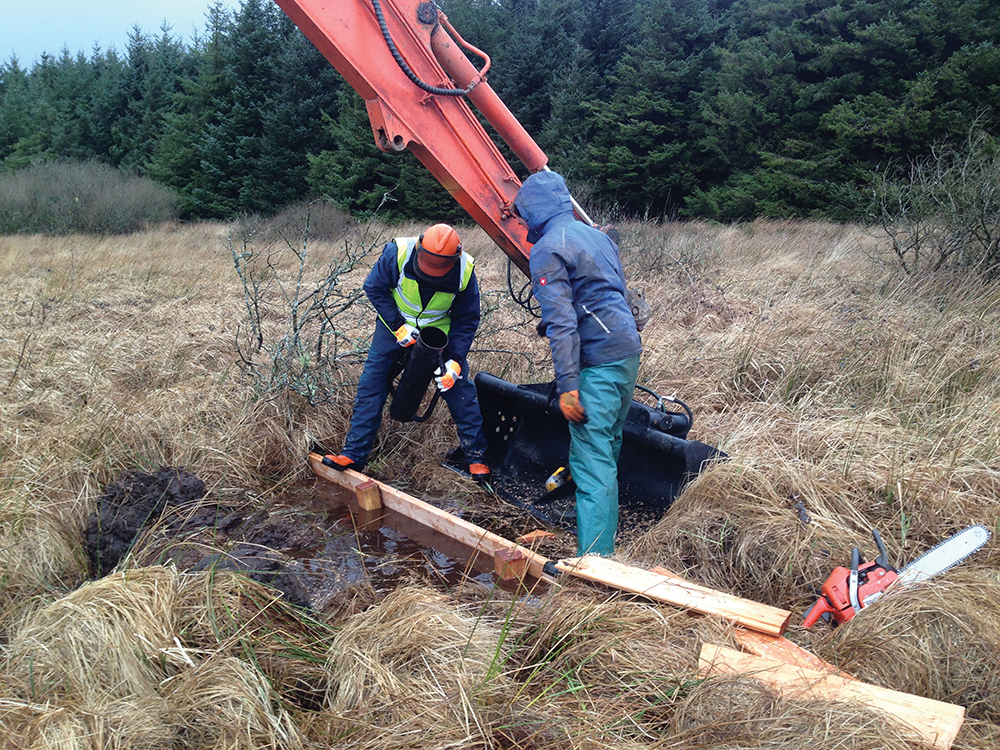An ambitious three-year project to restore peatland on the South West’s iconic moors has been awarded £2million.
A partnership of regional and local organisations including South West Water successfully applied for funding from the Department for Environment, Food and Rural Affairs (Defra) to restore 1,680 hectares of damaged peatland on Bodmin Moor, Dartmoor and Exmoor. Partnerships have been formed on all three moors including landowners, commoners and other interested parties to develop the proposals and this will continue through the delivery of the restoration.
The project is being led by Morag Angus, South West Water’s Exmoor Mires Partnership Manager, and will complement the company’s award-winning Upstream Thinking catchment management programme. It also aligns with Defra’s recently published 25-year Environment Plan which specifically mentions peatland restoration.
Morag explained: “This is an incredible partnership delivering peatland restoration. The peatlands of south-west England are very important for water quality, carbon storage, biodiversity, cultural history, recreation and farming but they are the most vulnerable in the UK to the impacts of climate change, due to their southerly position.
“For this reason they need to be prioritised nationally and restored for the benefit of all and future generations. The £2million from Defra presents a real opportunity to make a significant difference and to deliver sustainable management in these upland river catchments.”
Colette Beckham, Cornwall AONB Partnership Manager said: “We’re really delighted to be part of such an ambitious project which will make a significant improvement to the health of our South West peatlands. I’m particularly delighted for Bodmin Moor which, being the smallest moor of the three, has really benefited from a partnership approach with Exmoor and Dartmoor. We’re looking forward to getting cracking on the project and achieving some great things, working with our supportive landowners who have made this project possible.”
Alison Kohler, Director of Conservation and Communities at Dartmoor National Park, said: “Dartmoor Peatland Partnership is pleased that Defra have approved the grant funding. Dartmoor’s blanket bogs are crucial to our daily lives. 45% of South West Water’s daily water supply comes from Dartmoor and with peat up to seven metres deep they can store up to 10 million tonnes of carbon, that’s equivalent to a year’s emissions from UK industry. Visiting these iconic places can be truly uplifting and the plants and species they support are very special.
“The Peatland Partnership on Dartmoor is supporting the restoration plans through financial and in kind support; we are grateful for the support of landowners and farmers and will work closely with them to ensure that restoration not only maximises environmental enhancement but fits with farming practices and public access.”
Mary-Rose Lane, Biodiversity Technical Specialist at the Environment Agency, said: “The Environment Agency is delighted to be a part of this exciting project that will help restore the south west’s unique moorlands. Many of Devon and Cornwall’s rivers rise on these moors and the condition of the peat is crucial in supporting healthy rivers and wildlife. The moorlands play a vital part in the local economy so this focus is also welcome in supporting those who live and work on them.”
The moors of Bodmin, Dartmoor and Exmoor hold significant regional and national deposits of peat in the form of blanket bogs and valley mires. These wetland habitats are complex ecosystems that support diverse and unique ecology of national and international importance.
Over centuries, human interventions have and still are impacting upon the overall quality and distribution of wetland mire habitats and upland moors. The demise of such wetlands across extensive swathes of the moors has resulted in changes in the moorland ecology, including the loss of iconic species such as dunlin, golden plover, and Sphagnum mosses.
The challenge is to prevent further losses and halt the decline, while improving and restoring these habitats.
The project will be delivered by a partnership including government agencies, non-governmental organisations, landowners and farmers. Restoration work will start in August 2018.
Various ditch blocking techniques using sustainable materials (wood, peat, grass and heather) will be adopted on historic peat cuttings, drainage networks and eroding gullies in order to enable re-wetting of extensive areas of damaged peatlands.
Undertaking this peatland restoration will bring about multiple benefits. These include:
- Increasing the peatlands’ resilience to climate change and increasing carbon storage
- Improving the hydrological function of the peatlands by improving the quality and quantity of water leaving the moors
- Helping to store and slow the flow of water, potentially reducing the risk of flooding downstream
- Restoring the ecosystems that support the recovery of the habitats and associated wildlife
- Protecting and increasing our knowledge of our historic environment
- Maintaining and improving access
- Health and well-being benefits to society both locally and nationally
- A greater understanding of and experience for the numerous people who work in and visit these iconic landscapes.






